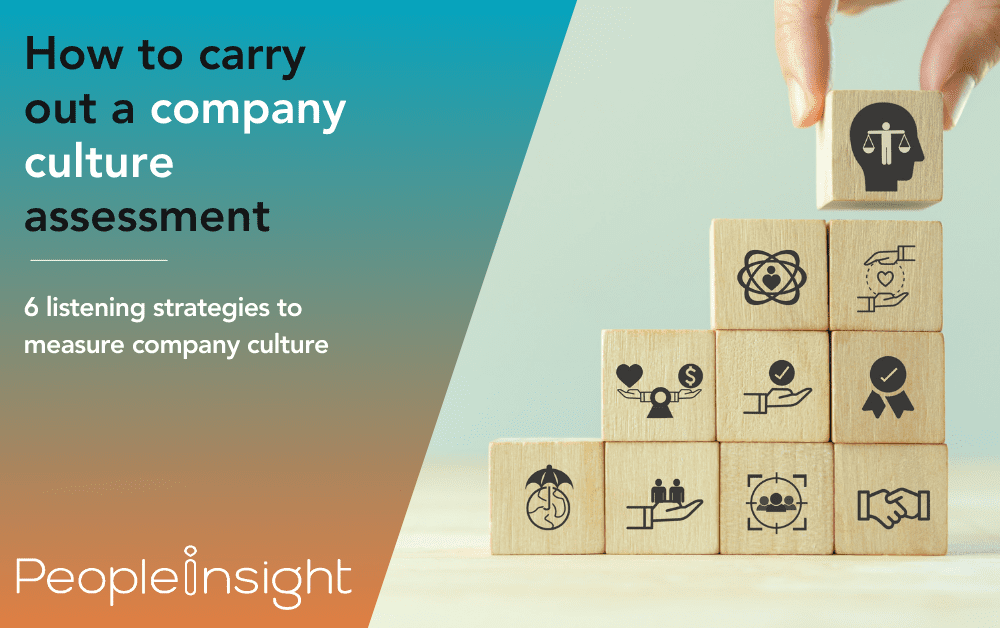
A quick insight: A company culture assessment reveals what employees truly experience in their day to day work. This blog explains how to carry out an assessment that highlights strengths and uncovers issues that may be hidden. It helps organisations understand where their culture stands and what is needed for meaningful change.
The words ‘competitive salary’ may well catch a high performer’s attention when they see your job advertised. Your list of benefits may be exhaustive and attractive, and you might have an expensive-looking office — and while all of this sounds fantastic, it isn’t what will keep your employees loyal.
Companies might come for the perks, but they stay for the culture. Company culture (otherwise known as organisational culture) is a combination of factors that makes your company unique. Company culture directly impacts employee engagement, productivity and, of course, retention. If your company culture is toxic, or simply at odds with what an employee wants, they’re not likely to stick around for long. This is why a company culture assessment is so very important. You need to understand as much as possible about your own culture. You need to be able to track, measure and improve elements over time in order to achieve your company’s full potential. By getting to grips with — and measuring — the company’s existing culture, we can help them achieve cultural consistency and alignment between values, behaviour and culture.
In this guide, we’ll cover six amazing employee listening strategies that help to accurately measure company culture. But first — what is a company culture assessment?
Read further: How Francis Crick evolved their listening strategy
A company culture assessment is a strategy put in place in order to evaluate the current state of a company’s culture. This generally involves gathering feedback from employees about their experiences, perceptions of the business and their alignment to the company’s values, to name a few. The ultimate aim of the assessment is to understand how the culture is functioning, and how it can be improved. An assessment can also allow companies to identify discrepancies between their actual culture and their ideal culture, giving them the tools required to make adjustments.
When company culture is assessed properly and accurately, the results can be incredible — greater levels of employee engagement, lower levels of voluntary turnover and improved performance. Company culture assessments can even be a powerful way to improve recruitment and onboarding processes, helping new employees integrate well into the workplace.
Related: 12 Motivating company culture quotes you’ll love
There are a few ways to assess and measure company culture. Below are six of the most effective listening strategies that will provide actionable insights into your current culture.
When discussing corporate culture and how to measure it, it’s best to start at the beginning — with your interview candidates and recent recruits. Surveying new and prospective employees helps you to understand how your brand, culture and values are perceived by those not overly familiar with your company. It also sheds light on the fairness and efficiency of your current recruitment process, as well as the perceptions of your hiring managers. Most importantly, this listening strategy provides a metric for how your company culture is actually perceived, vs. how you would desire — a metric you can track not just at the beginning of the employee lifecycle, but right the way through.
The more insightful data you collect, the better equipped you are to improve your recruitment and onboarding processes and make them more streamlined and conducive to great performance. Collecting data over time also reveals trends in employee engagement so that you can draw conclusions based on other notable changes within your company or to its processes.
Similarly, leavers surveys allow you to determine why employees have decided to hand in their notice or why they became disengaged with your company and its values. Again, this is powerful when compared to data from earlier in the employer journey, shedding insights about the point at which engagement may fall.
At People Insight, we have created a robust employee engagement model based on client research and expansive literature reviews. This information allowed us to design the Pearl™ model. Pearl™ provides our clients with a well-benchmarked employee engagement score that shows business leaders how happy employees are with various aspects of their organisation. The model analyses a company’s sense of Purpose, how Enabled they are to do their job well, their level of Autonomy, how content they are with Recognition and reward — and their attitudes towards Leadership.
Employee engagement surveys can provide valuable data that accurately reflects the company’s team culture when designed with this purpose. Such surveys also reveal the commitment and morale of employees and how aligned they are with your company’s values.
Find out how Croydon College’s survey and HR strategy has helped them transform and measure company culture.
An employee pulse survey is a frequent and fast-listening strategy. It has a shorter question set that employees answer as often as you can act; be it monthly, quarterly or whatever suits you best.
Pulse surveys allow companies to see quickly how any changes they have implemented have landed. They also help managers understand how organisational changes — whether big or small — have affected the culture and the employee experience, including employee engagement, motivation and morale.
360 feedback can allow individuals (leaders, managers or employees) to see how well they align to the values and behaviours supporting the organisation’s culture. At People Insight, we encourage the use of 360 feedback to increase self-awareness, promote dialogue and develop working relationships.
Using a tailored approach to 360 feedback, you can learn how people within your company engage and communicate with each other. You’ll also discover how supportive employees are of one another and whether there are any toxic elements you need to address and root out.
Related: Discover how Southampton Football Club have built an outstanding culture
After carrying out an employee engagement survey, it is worth progressing with an employee focus group to really deep dive into pressing issues and crowdsource opinions for improvement. Such a meeting can validate and clarify the results of the employee survey. It can also unearth the root causes of certain issues and provide deeper, valuable insights into how managers and business leaders can improve the company culture and offer more support to employees.
Focus groups allow employees to contribute to the discussion and to be heard. Be sure to let employees know there will be no penalty for expressing their thoughts or feelings during this focus group and always take action following a listening post. Otherwise, employees will believe this is an activity your company periodically carries out and simply pays lip service to.
When considering listening strategies and tools to measure and assess company culture, social media activity and interaction may not have been top of your list. However, it’s a useful consideration. Social media scanning can tell you a lot about how aligned your employees are with your values, how excited they are about their work and how enthusiastic they are about the company’s mission.
Ideally, you want your employees to live and breathe your company culture. You want them to become ambassadors and spread the word across social media. If your company has an active and enthusiastic social media presence, it is more likely to develop an enticing reputation for prospective hires. Employees who are engaged in the office and on social media will spread the word and help your company to find hires that are great cultural matches for your organisation.
A company culture assessment is a powerful tool for gaining insight into how aligned your employees are with your organisation’s values, behaviour and overall mission. By regularly measuring company culture using the six listening strategies outlined above, you are empowering your business with insightful, actionable data that works to improve and enhance the employee experience while creating a better work environment.
Looking to properly define and explore your culture? Enquire about our cultural assessment to ensure your company culture is aligned with your values, goals and people.

